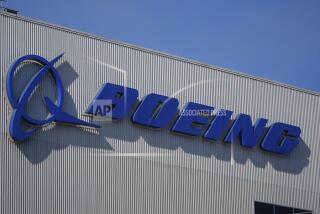Boeing Pension Data Sought
- Share via
Boeing Co. said Thursday that it was among six large manufacturing companies that have been asked by the Securities and Exchange Commission for information about accounting practices for a multibillion-dollar pension fund.
The SEC inquiry isn’t focused on payments to retirees but on how the companies account for their complex pension and retiree health plans and whether changes in assumed rates of returns can inflate earnings.
In addition to Boeing, the world’s largest aircraft maker, the federal regulatory agency has asked General Motor Corp. and Ford Motor Co. for documents about the way they estimate their pension liabilities.
The SEC has also sought information from truck builder Navistar International Corp., auto parts maker Delphi Corp. and Northwest Airlines Corp.
The requests, which aren’t connected to an investigation into any wrongdoing, are part of a new strategy to “preempt” problems and prevent an Enron-like accounting abuse, according to an SEC official who asked not to be identified.
Boeing said in a statement that it believed its accounting policies and practices were “in accordance with the highest standards and are accurate and complete.”
The SEC official said the agency was concentrating on companies with aggressive accounting assumptions related to huge pension liabilities. Boeing, for instance, has contributed nearly $4 billion to its pension fund since the start of 2003.
Boeing, headquartered in Chicago, is the largest private employer in Southern California with 36,000 workers. About 250,000 retired Boeing employees currently receive pension payments.
Critics have raised concerns about the way some companies use estimates of future returns on pension investments to lower their pension costs.
For example, if a company forecasts an optimistic rate of return on its investments to fund the plans, it doesn’t have to put aside as much money to cover the liabilities. The extra money not funneled into a pension investment could be used to inflate earnings.
“There isn’t a very good model of how you do this,” said Paul H. Nisbet, an analyst for JSA Research Inc. “The SEC wants to get a good handle on this but I suspect this is more of them fishing for something than a targeted investigation.”
In 2003, Boeing assumed it would have an 8.75% return; instead it was 17%. GM assumed it would have a 9% return but actually had a 22% return.
The assumptions helped lower the cost of pension investments and thereby mitigated any drag on earnings.
“For some companies even a 1% change in an assumption might result in a significant dollar difference” on financial statements, said Brian Lane, a partner with Gibson, Dunn & Crutcher in Washington.
All the companies that received SEC requests for information said they were cooperating with the inquiry.
Shares of Boeing rose 60 cents to $49.56 on the New York Stock Exchange.
*
Times wire services contributed to this report.
More to Read
Inside the business of entertainment
The Wide Shot brings you news, analysis and insights on everything from streaming wars to production — and what it all means for the future.
You may occasionally receive promotional content from the Los Angeles Times.










